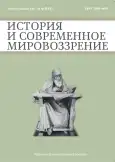State Policy in the Field of Computer Technology Development in the 1950s: Achievements and Blocking Factors
- Authors: Bodrova E.V.1, Kalinov V.V.2, Efremenko V.V.1
-
Affiliations:
- «MIREA — Russian Technological University»
- National University of Oil and Gas «Gubkin University»
- Issue: Vol 5, No 2 (2023)
- Pages: 48-56
- Section: ECONOMIC HISTORY
- URL: https://bakhtiniada.ru/2658-4654/article/view/257438
- DOI: https://doi.org/10.33693/2658-4654-2023-5-2-48-56
- EDN: https://elibrary.ru/GVJRJF
- ID: 257438
Cite item
Abstract
The purpose of the publication, based on currently declassified documents, is to investigate the actual problem of the evolution of state policy in the field of computer technology development in the USSR in the 1950s. The conclusion is formulated that the «cold war», the unfolding scientific and technological revolution stimulated the implementation of their own projects in the field of information technology and hardware platforms in the USSR. A significant factor that determined the creation of various domestic computers in the early 1950s was the support at the state level of developments independent of Western analogues. The continuous growth in demand for calculating machines and the release in 1956 of a number of government decisions on the creation of new types of such machines forced the leadership of various departments to take urgent measures to accelerate the development of the mathematical engineering industry. In the period from 1955 to 1957, samples of high-performance computing and mathematical machines were created. A number of them were sent to mass production. Computer centers were created on the basis of new computer technology. However, in general, the development of computer technology in the country lagged behind the United States. The documents allow us to identify a number of factors that determined the braking of this process: the industrial management reform being carried out at that time, the departmental approach, the lack of understanding by the country's leadership of the special significance of this area of industrial and scientific and technical policy, the absence of a single center coordinating this work. The Scientific Council on Computer Technology and Control Systems of the State Committee of the USSR Academy of Sciences for Science and Technology and the Presidium of the USSR Academy of Sciences was established only in 1966.
Full Text
##article.viewOnOriginalSite##About the authors
Elena V. Bodrova
«MIREA — Russian Technological University»
Author for correspondence.
Email: evbodrova@mail.ru
ORCID iD: 0000-0001-7889-3054
Dr. Sci. (Hist.), Professor, Head of the Department of Humanities and Social Sciences
Russian Federation, MoscowVyacheslav V. Kalinov
National University of Oil and Gas «Gubkin University»
Email: evbodrova@mail.ru
ORCID iD: 0000-0002-9709-7720
Dr. Sci. (Hist.), Associate Professor, Head of the Department of History
Russian Federation, MoscowValentin V. Efremenko
«MIREA — Russian Technological University»
Email: valek-efr@mail.ru
Cand. Sci. (Hist.), Associate Professor of the Department of Humanities and Social Sciences
Russian Federation, MoscowReferences
- Bodrova E.V., Kalinov V.V. On the degree and methods of borrowing Western scientific and technical achievements in the oil industry during the years of forced industrialization. 1930s. // Bulletin of the archivist.2021. №4. Pp. 1179-1191. doi: 10.28995/2073-0101-2021-4-1179-1190
- Bodrova E.V., Kalinov V.V., Krasivskaya V.N. Scientific engineering and technical societies in the system of party-state management in the years of forced industrialization // Bulletin of SurGPU. 2022. No. 6 (81). Pp. 130–141.
- Bokarev Yu.P. Technological war and its role in the geopolitical confrontation between the USA and the USSR // Proceedings of the Institute of Russian History. Issue 8. Moscow: Nauka, 2009. Pp. 252–297.
- Khanin G.I. The decade of the triumph of the Soviet economy. The fifties. //Free Thought — XXI. 2002. No. 5. Pp. 72–89.
Supplementary files








